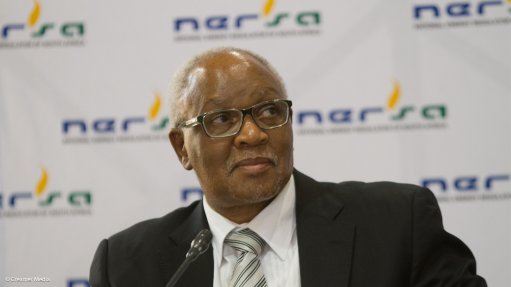
Nersa fulltime regulatory member for electricity Mbulelo Ncetezo says decision should be announced on December 7
Photo by: Duane Daws
State-owned power utility Eskom has rejected calls for its 2018/19 tariff to be capped at the level of inflation, arguing that such a move would be financially unsustainable as it would result in a revenue reduction, which would further squeeze its liquidity and could place the country’s credit rating at further risk.
Several business organisations, individual companies and civil society groups called on the National Energy Regulator of South Africa (Nersa) to restrict the hike to consumer price inflation, or lower, arguing that Eskom should improve its sustainability by embarking on aggressive cost cutting and by addressing serious allegations of corruption and wasteful expenditure.
Several presenters also called for the utility to save costs by accelerating the decommissioning of expensive coal-fired generation and possibly even by curtailing its build programme in light of indications that Eskom would be running a sizeable electricity surplus for the foreseeable future.
However, Eskom showed little sign on Monday that it had been moved by appeals – made through 23 000 submissions to Nersa and oral presentations at hearings held in just about all of the nine provinces – for it to depart from its ‘business-as-usual’ tariff application.
The utility did, however, make some slight adjustments to its application in relation to expected sales volumes and costs associated with independent power producers (IPPs).
Eskom is now forecasting ‘standard tariff’ sales of only 188 TWh and ‘total sales’ of 211 TWh, as opposed to 216 TWh in its original application. It has also removed 6 305 GWh of IPP purchases, worth R7.1-billion in its revenue application, owing to delays in the introduction of renewables projects procured in 2015, but where contracts remained unsigned.
As a result, the tariff application has been moderated by R6.6-billion, lowering Eskom’s calculation of allowable revenue to R212.8-billion, from R219.5-billion in the original application. However, the lower standard tariff sales would still mean an average hike of 18.9% from April 1 and municipal increases of 26.9% from July 1.
The utility defended its decision not to accelerate the decommissioning of Camden, Hendrina, Komati and Grootvlei on the basis that it would not be prudent to withdraw the capacity until Medupi and Kusile were fully operational. However, it would begin placing some of the station into cold reserve during 2019/20.
It also argued that it made “no business sense” to curtail construction of Medupi and Kusile, which had reached 84.7% and 82.6% project completion respectively.
Acting CFO Calib Cassim stressed, too, that as a State-owned company Eskom’s business model was determined by policy. “Therefore, we don’t have the latitude to pursue only profitable customers or stop supplying non-paying customers.
Nersa fulltime regulatory member for electricity Mbulelo Ncetezo described the decision ahead of the regulator as being a “very difficult one”. However, he promised that all submissions would be considered in coming to a determination.
Nersa expected to announce its decision on December 7.